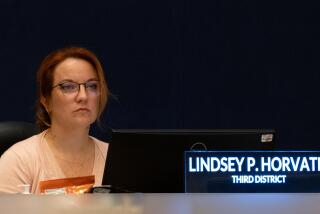L.A. County supervisors roll back plans for a drug take-back program

Los Angeles County supervisors backed off from a proposal Tuesday that would have required pharmaceutical companies to pay for a countywide drug take-back and disposal program, opting instead for a scaled-back voluntary program in the near term.
The county has been considering a mandated take-back program for prescription and over-the-counter drugs and syringes over the last year. Several other California counties have already adopted similar ordinances.
Consumer advocates and public health officials said an expanded drug take-back program is needed because the existing drop-off sites – including 21 sheriff’s stations and seven Walgreens pharmacies around the county – are too few for a county of 10 million people and inconvenient for many residents.
They argue that a better disposal system would prevent water contamination and overdose deaths.
“The nexus between inadequate disposal of prescription drugs and the nationwide opiate epidemic is well established,” interim county Health Officer Jeffrey Gunzehauser told county supervisors Tuesday.
Pharmaceutical industry representatives, who would be required to pay to set up and run the program, pushed back against it, saying it would be ineffective and too expensive.
Industry groups opposed to the proposal spent more than $300,000 lobbying the county over the last year, according to disclosure documents.
Instead of a mandatory take-back program, drug manufacturers offered to pay for an education and outreach program about existing take-back options and to explain how to dispose of unused medications in the trash, a method opposed by county public health officials.
At Tuesday’s hearing, supporters, including environmentalists, senior groups and Los Angeles Councilman Paul Koretz – who said that as a diabetic, he had struggled with how to dispose of his used needles – urged the supervisors to adopt the disposal program, while industry groups pushed for their own proposal.
Carrie Hartgen of the Advanced Medical Technology Assn. told the supervisors that a voluntary industry-funded education campaign would produce “real results in a more cost-effective manner.”
In the end, Supervisor Michael D. Antonovich, who had originally proposed the mandated drug take-back program, offered a new proposal under which county staff will work with the industry groups and other stakeholders to come up with a public education campaign and to host quarterly take-back events while studying the outcomes of the disposal kiosks at Walgreens.
Any action on a mandatory program would be pushed back to at least November.
The board voted to approve the new proposal, with supervisors Sheila Kuehl and Hilda Solis abstaining. The two had pushed for a more extensive disposal program.
Antonovich’s health deputy, Fred Leaf, said the drug manufacturers had agreed to pay for the more limited program the board passed Tuesday.
He said Antonovich wanted to move forward with a program as quickly as possible, and that other counties that passed mandatory programs “haven’t been able to move anything forward successfully.”
“He would like to do this as a true public-private partnership,” he said.
A coalition of five industry groups praised the board’s action in a statement, saying, “Thanks to the leadership of the … Board of Supervisors, a broad coalition is coming together to teach, promote and enable proper medication disposal in LA County.”
Priscilla VanderVeer, a spokeswoman for the Pharmaceutical Research and Manufacturers of America, could not provide a cost estimate for either the take-back program originally proposed or the scaled-back voluntary program.
Heidi Sanborn, executive director of the National Stewardship Action Council, a consumer advocacy group that supports mandated drug take-back programs, said she was “not surprised, and incredibly disappointed” by the board’s vote.
“It doesn’t seem to matter what the public thinks,” she said. The pharmaceutical industry groups, she said, “don’t want to pay, but they’ll spend a fortune on lobbyists.”
Antonovich and Supervisor Don Knabe will retire from the board at the end of this year. Kuehl promised to keep pushing for a mandated, industry-funded disposal program after that.
“I look forward to a very strong ordinance, even if it has to be in 2017,” she said.
Twitter: @sewella
More to Read
Start your day right
Sign up for Essential California for news, features and recommendations from the L.A. Times and beyond in your inbox six days a week.
You may occasionally receive promotional content from the Los Angeles Times.






